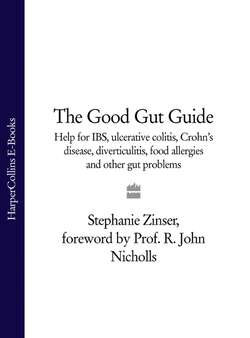Читать книгу The Good Gut Guide: Help for IBS, Ulcerative Colitis, Crohn's Disease, Diverticulitis, Food Allergies and Other Gut Problems - Stephanie Zinser - Страница 7
Introduction
ОглавлениеWhen I was 25 years old I experienced a disturbing symptom – bleeding from my bottom. Because I was then pregnant, I put it down to simple haemorrhoids and thought nothing more of it.
I never suspected that this was the beginning of a decade’s worth of increasingly serious illness that I would face virtually alone, unaided and only vaguely informed. It wasn’t the doctors’ fault – they told me what, medically, I needed to know. And there were support groups, although I tended to notice only the people who suffered far worse than I did. Because of this, I shied away from associating with them – as if the seriousness of their illnesses might somehow be contagious.
Things that go wrong with your guts cause great embarrassment and this in turn makes them frightening. You don’t automatically know who to talk to or what words to use, and when you do seek medical help the resulting procedures can be embarrassing as well as uncomfortable.
For some reason bowel and intestinal disorders have always been viewed as older people’s afflictions, despite the fact that most cases of ulcerative colitis (UC), Crohn’s disease and IBS start during a person’s mid-twenties (or younger) – when many people are single, embarking on relationships, starting families or juggling demanding careers and busy social lives. I’m not sure why this false image has so stubbornly persisted, although I believe it is slowly changing.
As a health writer, I am regularly bombarded by information about new treatments – not just from orthodox medicine, but also from the herbal, dietary and complementary sides. My personal view is that the key to a ‘golden cure’ is not the preserve of any one of these camps. The answer to bowel illnesses is probably (and quite unsatisfactorily for those of us who like things neat and tidy) a complicated mixture of several elements, the proportions and exact ingredients of which we simply cannot isolate today. It’s up to us to look carefully at every possibility, to try whatever we feel may be right for us, and work toward the best possible outcome – good gut health.
And that’s why I’ve written this book – to provide the appropriate information so that the reader can play an active role in achieving good gut health. It isn’t a book that features only a couple of gut problems in great detail. Neither is it a medical encyclopaedia that covers a whole raft of illnesses on a basic level. It is a user-friendly book for anyone who has ever experienced gut problems – and one that discusses them in a way that people understand.
This book looks at all types of intestinal symptoms – like diarrhoea, wind, constipation, nausea, abdominal pain and more – and offers practical solutions for dealing with them. Not just medical solutions, but self-help – including dietary and lifestyle tips, herbal help and a whole range of complementary therapies, from flower remedies to Ayurveda (an ancient Indian system of medicine). This approach is vital. People today are more proactive in choosing their healthcare than ever before and it is important to me that this book strongly reflects the diverse range of options now available.
Having looked at symptoms, the book then homes in on the diseases that are the key culprits of gut trouble and explains, simply but in detail, what these diseases are, what causes them, who they typically affect, what the risk factors are, how to prevent them and what medical treatments are available. Again, I have included practical advice for the patient in terms of self-help, dietary management, alternative treatments and prevention.
Lastly, the book focuses on the person behind the illness. It looks at the effect that chronic or embarrassing illnesses can have on our daily lives, our personalities and our relationships. It offers advice on the practicalities of living a normal life and coping with depression, hospitals, illness and surgery. There is also a large resource section at the back of the book for anyone who wants access to support groups, medical agencies and further information.
